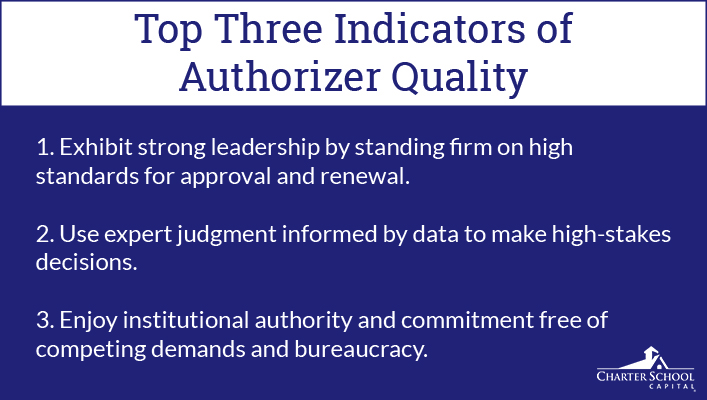What sets apart charter school authorizers?
Editor’s note: This post was originally published here by CRPE Reinventing Public Education and written by Robin Lake. After our enlightening discussion with Darlene Chambers, Sr. Vice President for Programs and Services, National Charter Schools Institute, on the vital role charter school authorizers play in the three-legged charter school ‘stool’ (check this out for clarification), we wanted to start diving a bit deeper into each of the three legs. This is an interesting piece on the role of authorizers and what some exceptional ones are doing that sets them apart. We think it’s vital to keep tabs on the pulse of all things related to charter schools, including informational resources, and how to support charter school growth. We hope you find this—and any other article we curate—both interesting and valuable.
New NACSA Study: Addressing the Need for Evidence in Authorizing
One of the essential features of a charter school, what most distinguishes it from a district school or voucher-receiving school, is that it is “authorized” by a public agent and held accountable for results promised in its performance contract.
When Paul Hill and I first started writing about charter schools, we expected that these “authorizers,” most of them school districts that had never overseen performance effectively, would face a steep learning curve. That was confirmed in a federally funded research project we ran on charter school accountability in the late 1990s. Most authorizers we interviewed told us that they were really only planning on holding charter schools accountable for compliance with state regulations. As long as they stayed out of the newspaper, they would likely be renewed.
Thankfully, we’ve come a long way since then. Many charter authorizers have set a high bar for taking a balanced scorecard approach to school accountability (looking at a variety of measures of school and organizational effectiveness), using school visits and classroom observations to inform the renewal process, and more recently, taking innovative approaches to equity questions, like ensuring fair access for students with disabilities or finding thoughtful solutions to reduce instances of suspensions and expulsions. In other words, the best charter authorizers in the country have really been pioneers for performance management in public education.
A new study by the National Association of Charter School Authorizers (NACSA) set out to understand exactly what it was that “cream of the crop” authorizers were doing to distinguish themselves. NACSA carefully gathered data on indicators of authorizer quality: They looked at things like growth rates on test scores, rates of closure (to see if performance contracts were being enforced), fiscal responsibility, and whether quality schools were allowed to expand. They then selected authorizers that oversaw a high-quality “portfolio” of schools and compared them to average authorizers.

NACSA homed in on five authorizers—SUNY, DC Charter School Board, Thomas B. Fordham Foundation (Ohio), Massachusetts Board of Education, and Metropolitan Nashville Public Schools—and identified a long list of common and distinguishing attributes among them. Most notably, they all:
- Exhibit strong leadership by standing firm on high standards for approval and renewal. In other words, they stood up for quality even when it meant politically challenging decisions.
- Use expert judgment informed by data to make high-stakes decisions. Authorizing, they said, is not a paint-by-numbers job. The best authorizers deliberate, debate, and build professional knowledge.
- Enjoy institutional authority and commitment-free of competing demands and bureaucracy. Obviously, professional expertise and leadership are impossible to maintain if a charter school office is underresourced, lacks real decisionmaking power, or is buried three levels down in an organizational chart.
NACSA also finds that the best authorizers are obsessed with data, have strong relationships with schools and respect their autonomy, are clear about how authorizing decisions affect their annual goals, etc.
Most of the five authorizers profiled are well documented, and it won’t come as big news to most authorizers that leadership, judgement, and authority matter. The report’s main value is in the richness of detail. There is a trove of fine-grained guidance throughout this report on how authorizers can stay focused on their key task: performance management.
Despite the care and caution NACSA took with their report, it didn’t address a series of new realities that I’ve been thinking about a lot lately. Nationally, charter growth has slowed dramatically. The supply of quality applicants seems to be dwindling, access to facilities and talent are drying up, and political backlash at both the local and national levels is intensifying.
We cannot ignore these realities as we think about what “quality authorizing” is. Ironically, Nashville Public Schools has been at the epicenter of some of the most intense charter politics. Though the schools they have approved are performing very well, a hostile board makes life miserable for existing charters and surely has had a chilling effect on new applicants.
It’s also tough to ignore the fact that charter applications have become more onerous and charter oversight more bureaucratic. Creeping reregulation has surely prevented some number of promising operators from getting off the ground.
And while professional judgment is a necessary element of authorizing, there is always a danger that authorizer hubris about “what works” may unnecessarily limit innovation and the diversity of options for families.
Of course, no single research report can answer every question. The always thoughtful Karega Rausch, NACSA’s VP of research evaluation, makes clear that, 1) their findings are not definitive or causal, and 2) more work is needed to understand which authorizer practices are most related to quality outcomes.
My hope is that more research on charter authorizing will happen soon and will include a broader look at questions like:
- The politics of authorizing and how it can be better managed.
- Which of NACSA’s recommendations and authorizer application requirements could be eliminated with little cost to quality.
- How authorizers can more actively remove barriers to charter growth.
- How authorizer portfolios perform (which are strong on quality but weak on growth, etc.). As a member association, NACSA didn’t publish data on the not-so-stellar authorizers, but someone should.
Authorizing is a power that must be used wisely. At this point in the charter movement, authorizers urgently need to know as much as possible to inform their work. And we need to hold them accountable for doing so.
We’d love to hear your thoughts and comments on this topic. Please leave them below.
Charter School Capital is committed to the success of charter schools and has solely focused on funding charter schools since the company’s inception in 2007. Our depth of experience working with charter school leaders and our knowledge of how to address charter school financial and operational needs have allowed us to provide over $1.6 billion in support of 600 charter schools that educate 800,000 students across the country. For more information on how we can help your charter school, contact us!
